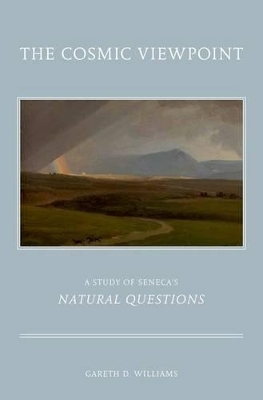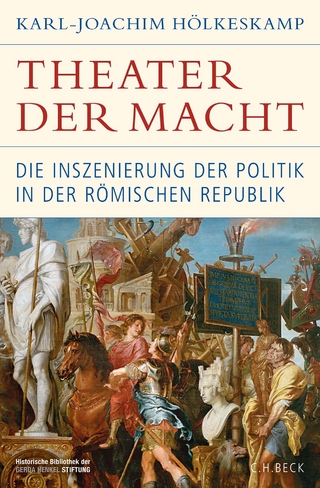
The Cosmic Viewpoint
A Study of Seneca's 'Natural Questions'
Seiten
2012
Oxford University Press Inc (Verlag)
978-0-19-973158-9 (ISBN)
Oxford University Press Inc (Verlag)
978-0-19-973158-9 (ISBN)
This book examines the literary and philosophical qualities essential to Seneca's art of science in his Natural Questions. Seneca's meteorological theme raises our gaze from a terrestrial level to a higher, more intuitive plane - a conceptual climb by which Seneca promotes a change of perspective in his readership towards the cosmic viewpoint.
Seneca's Natural Questions is an eight-book disquisition on the nature of meteorological phenomena, ranging inter alia from rainbows to earthquakes, from comets to the winds, from the causes of snow and hail to the reasons why the Nile floods in summer. Much of this material had been treated in the earlier Greco-Roman meteorological tradition, but what notoriously sets Seneca's writing apart is his insertion of extended moralizing sections within his technical discourse. How, if at all, are these outbursts against the luxury and vice that are apparently rampant in Seneca's first-century CE Rome to be reconciled with his main meteorological agenda? In grappling with this familiar question, The Cosmic Viewpoint argues that Seneca is no blinkered or arid meteorological investigator, but a creative explorer into nature's workings who offers a highly idiosyncratic blend of physico-moral investigation across his eight books. At one level, his inquiry into nature impinges on human conduct and morality in its implicit propagation of the familiar Stoic ideal of living in accordance with nature: the moral deviants whom Seneca condemns in the course of the work offer egregious examples of living contrary to nature's balanced way. At a deeper level, however, The Cosmic Viewpoint stresses the literary qualities and complexities that are essential to Seneca's literary art of science: his technical enquiries initiate a form of engagement with nature which distances the reader from the ordinary involvements and fragmentations of everyday life, instead centering our existence in the cosmic whole. From a figurative standpoint, Seneca's meteorological theme raises our gaze from a terrestrial level of existence to a more intuitive plane where literal vision gives way to 'higher' conjecture and intuition: in striving to understand meteorological phenomena, we progress in an elevating direction - a conceptual climb that renders the Natural Questions no mere store of technical learning, but a work that actively promotes a change of perspective in its readership.
Seneca's Natural Questions is an eight-book disquisition on the nature of meteorological phenomena, ranging inter alia from rainbows to earthquakes, from comets to the winds, from the causes of snow and hail to the reasons why the Nile floods in summer. Much of this material had been treated in the earlier Greco-Roman meteorological tradition, but what notoriously sets Seneca's writing apart is his insertion of extended moralizing sections within his technical discourse. How, if at all, are these outbursts against the luxury and vice that are apparently rampant in Seneca's first-century CE Rome to be reconciled with his main meteorological agenda? In grappling with this familiar question, The Cosmic Viewpoint argues that Seneca is no blinkered or arid meteorological investigator, but a creative explorer into nature's workings who offers a highly idiosyncratic blend of physico-moral investigation across his eight books. At one level, his inquiry into nature impinges on human conduct and morality in its implicit propagation of the familiar Stoic ideal of living in accordance with nature: the moral deviants whom Seneca condemns in the course of the work offer egregious examples of living contrary to nature's balanced way. At a deeper level, however, The Cosmic Viewpoint stresses the literary qualities and complexities that are essential to Seneca's literary art of science: his technical enquiries initiate a form of engagement with nature which distances the reader from the ordinary involvements and fragmentations of everyday life, instead centering our existence in the cosmic whole. From a figurative standpoint, Seneca's meteorological theme raises our gaze from a terrestrial level of existence to a more intuitive plane where literal vision gives way to 'higher' conjecture and intuition: in striving to understand meteorological phenomena, we progress in an elevating direction - a conceptual climb that renders the Natural Questions no mere store of technical learning, but a work that actively promotes a change of perspective in its readership.
Gareth D. Williams is Violin Family Professor of Classics at Columbia University.
Abbreviations ; Introduction ; I. Interiority and Cosmic Consciousness in the Natural Questions ; II. Seneca's Moralizing Interludes ; III. The Cataclysm and the Nile ; IV. The Rhetoric of Science ; V. Seneca on Winds ; VI. Earthquakes, Consolation, and the Senecan Sublime ; VII. Seneca on Comets and Ancient Cometary Theory ; VIII. Seneca on Lightning and Divination ; Epilogue ; Bibliography
| Zusatzinfo | 1 line art |
|---|---|
| Verlagsort | New York |
| Sprache | englisch |
| Maße | 236 x 155 mm |
| Gewicht | 680 g |
| Themenwelt | Geschichte ► Allgemeine Geschichte ► Altertum / Antike |
| Geisteswissenschaften ► Philosophie ► Philosophie Altertum / Antike | |
| Geisteswissenschaften ► Sprach- / Literaturwissenschaft ► Anglistik / Amerikanistik | |
| Geisteswissenschaften ► Sprach- / Literaturwissenschaft ► Literaturwissenschaft | |
| ISBN-10 | 0-19-973158-6 / 0199731586 |
| ISBN-13 | 978-0-19-973158-9 / 9780199731589 |
| Zustand | Neuware |
| Haben Sie eine Frage zum Produkt? |
Mehr entdecken
aus dem Bereich
aus dem Bereich
die Inszenierung der Politik in der römischen Republik
Buch | Hardcover (2023)
C.H.Beck (Verlag)
CHF 67,20
Buch | Hardcover (2024)
Klett-Cotta (Verlag)
CHF 69,95


